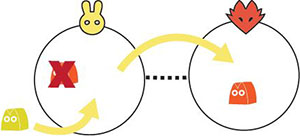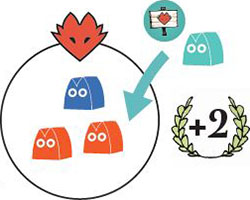
Lizard Cult

The Cult relies on word of mouth and beak to spread its gospel, and new enclaves can spring up anywhere on the map. Where the Cult rules clearings, they can build gardens, which will further radicalize the animals that live there.
While other factions spend cards to achieve their aims, the Cult acts chiefly by revealing cards and gradually drafting the ideal set of followers. Unless used for scoring, these cards are not spent and are returned to the Cult's hand during Evening.
However, this gentler approach makes movement and battle difficult, so these actions can only be undertaken by the most radicalized members of the Cult-their acolytes.
The gardens of the Lizard Cult attract Pilgrims, so the Cult rules any clearings where they have gardens, even one. This special ability trumps even the Eyrie's Lords of the Forest.
When the Cult is in play, spent and discarded cards are placed in the Cult's Lost Souls pile rather than the discard pile. At the start of the Cult's turn, the most common suit of Lost Souls sets the Outcast, the suit of clearings where the Cult can perform conspiracies with their acolytes for that turn.
Acolytes can be gained by Revenge: whenever you remove a warrior defending in battle, you place it in your Acolytes box.
Birdsong
Look at the cards in the Lost Souls pile, ignoring any bird cards. If one suit has more cards than any other suit, that suit becomes the Outcast - move the outcast marker to the new suit. If this suit was already the Outcast, it becomes the Hated Outcast -flip the outcast marker.
Then, move all of the cards in the Lost Souls pile to the discard pile.
Finally, you can spend acolytes - warriors in your Acolytes box - to perform conspiracies. If the Outcast is Hated, all conspiracies cost one less acolyte.
Crusade: Spend two acolytes to battle in an Outcast clearing or move from an Outcast clearing and then, if you wish, battle in the destination clearing.
Convert: Spend two acolytes to remove an enemy warrior from an Outcast clearing and then place a warrior there.
Sanctify: Spend three acolytes to remove an enemy building from an Outcast clearing and then place a garden there.
Acolytes Example
At the start of Birdsong, the Cult has four acolytes. Rabbits are the Outcast.
First, they spend two acolytes to convert the Marquise warrior in the rabbit clearing. The Marquise warrior is removed, and a Cult warrior is placed there.
Second, they spend two acolytes to crusade with the warrior in the rabbit clearing, They choose to move the warrior to an adjacent clearing and battle against the Marquise.
Daylight
Reveal any number of cards from your hand, and perform one ritual per card, as follows. You cannot use revealed cards for any other purpose during Daylight.
Hatred of Birds: Bird cards are not wild when performing rituals!
Build: Reveal a card matching a clearing you rule to place a garden there.
Recruit: Reveal a card to place a warrior in a matching clearing.
Sacrifice: Reveal a bird card to place a warrior in the Acolytes box.
Score: Spend the revealed card (placing it in the Lost Souls Pile) to score the victory points listed by the Gardens column of the rightmost empty space matching the card spent.
Evening
Return any revealed cards to your hand. Then, you may craft cards by activating gardens that match the Outcast suit.
Finally, draw one card plus one per uncovered draw bonus. If you have more than five cards in your hand, discard down to five.

Riverfolk Company

When news arrived that the Woodland on the shore of the great lake was descending into all-out war, the Riverfolk Company quickly dispatched its officers to set up shop.
As the other factions purchase services, the Riverfolk will be able to further entrench their commercial interests by building trade posts across the forest. The construction of these posts is a viable way to score victory points, but so too are dividends they might gain from their wealth.
The Riverfolk are excellent Swimmers, so they treat rivers as paths, and they can move between clearings connected by a river regardless of who rules the origin or destination.
Services
The Riverfolk Company is a commercial faction that offers services to the other players. They set the costs of their services during their Evening.
For Sale: The Riverfolk's hand is always shown face up above their faction board.
Any other player, at the start of their Birdsong, may buy one Riverfolk service plus another per clearing with a trade post and any of their pieces. The buyer pays for services by taking warriors from their own supply and placing them in the Riverfolk's Payments box.
Hand Card: The buyer takes a card from the Riverfolk's hand and adds it to their hand.
Riverboats: The buyer treats rivers as paths until the end of their turn.
Mercenaries: During Daylight and Evening of this turn, the buyer treats Riverfolk warriors as their own for rule and battle.
Buying a Service Example

At the start of the Eyrie's Birdsong, Payments the Eyrie can purchase up to two services because they have pieces in one clearing with a trade post.
Mercenaries currently cost 3. The Eyrie decide to buy them, so they move three warriors from their supply to the Riverfolk's Payments box. With these mercenaries the Eyrie rule the rabbit clearing, so they can build a roost there, assuming the right card is in the Decree.
Birdsong
If your Payments box is empty, place two warriors in it. Then, if you have any trade posts on the map, score one victory point per two funds (warriors in the Funds box). Finally, move all warriors on your faction board to the Funds box.
Daylight
You can take action by spending and committing funds-warriors in your Funds box. When you spend a fund, return the warrior to its owner's supply. When you commit a fund, move the warrior to the Commitments box.
-
Move: Commit a fund to take a move.
-
Battle: Commit a fund to initiate a battle.
-
Craft: Commit funds to craft a card from your hand. Instead of moving these warriors to the Commitments box, you must place them on empty spaces of the Trade Posts tracks matching the suits of the crafting cost.
Exporting: Instead of gaining a card's listed crafting effect, you may discard the card and place a warrior in your Payments box.
-
Draw: Commit a fund to draw a card.
-
Recruit: Spend a fund to place a warrior in any clearing with a river.
-
Establish Trade Post with Garrison: Spend two funds to place a trade post and a warrior in a clearing. You must spend funds of the faction who rules the chosen clearing. Each clearing may have only one trade post.
Trade Disruption: Whenever a trade post is removed, remove half of your funds and return that trade post to the box. It cannot be rebuilt!
Establishing a Trade Post Example
The Riverfolk want to establish a trade post in this fox clearing, rte Marquise rules, so the Riverfolk must spend two Marquise fund.
Tte Riverfolk place a fox trade post with a warrior there, and score two victory points,
Evening
If you have more than five cards in your hand, discard down to five. Then, you may set the costs for your three services by moving the service markers on your Services tracks.
Mechanical Marquise
The Mechanical Marquise is an automated player that can be used in two ways.
- First, it can replace a human Marquise player in a multiplayer competitive game.
- Second, with a couple changes to the rules, it can be an opponent in a cooperative game for one to four players.
The Mechanical Marquise uses the pieces of the Marquise de Cat, so you cannot include both in the same game.
Poor Manual Dexterity: The Mechanical Marquise does not have a hand of cards. It cannot be forced to discard cards. If you would take a card from its hand, draw a card from the deck instead.
If you would give it a card, discard the card, and the Mechanical Marquise scores one victory point.
Hates Surprises: Ambush cards cannot be played against the Mechanical Marquise.
Setup
When including the Mechanical Marquise, modify the following steps of setup.
1st. Choose Factions.
Give the Mechanical Marquise a random seating position, as if it were a human player.
One player sitting near the Mechanical Marquise will be responsible for setting it up and playing its turns. The rest of these rules are written from the perspective of this player.
3rd. Deal Cards.
Before shuffling the deck, remove the four dominance cards and add the four spy cards. Draw five cards, not three, for the Mechanical Marquise.
Place these five cards in a row on a card stand so the players can only see the card backs. This is the Mechanical Marquise's Schedule of Orders.
4th. Make Item Supply.
Take a  ,
,  ,
,  , and
, and  from the item supply and place them in the Items for Sale box on the Mechanical Marquise's faction board.
from the item supply and place them in the Items for Sale box on the Mechanical Marquise's faction board.
7th Set Up Factions. Follow the Marquise's rules for faction setup, but ignore steps 4 (6.3.4) and 5 (6.3.5). The Mechanical Marquise does not use the Marquise's buildings.
Birdsong
Score two victory points per clearing you rule where you have at least three warriors.
Daylight
Reveal the leftmost card on the Schedule of Orders, take the following actions, then dis- card the card. Move and battle happen in all clearings matching the suit of the order card.
Recruit happens in clearings based on the order's crafting cost, as described in step 3.
-
Step 1: Battle.
Initiate a battle in each clearing with your warriors and any enemy pieces. If a clearing has multiple enemy factions, choose the defender in this priority order: most pieces there, then most victory points, then highest setup priority (A, B, C, etc)..
-
Step 2: Move.
Starting with the clearing with the lowest number in the Clearing Priority box (1, 2, etc). and going up, move from clearings you rule with four or more of your warriors.
For each move, move all of your warriors except for three from the origin clearing. The destination is the adjacent clearing with the most enemy pieces, then the tied clearing with the lowest number in the Clearing Priority box.
-
Step 3: Recruit.
Place warriors in clearings you rule based on the crafting cost of the revealed order card, as shown below. If it has no crafting cost, restart Daylight, revealing the next order card-if the Schedule of Orders has no more cards, go to Evening.
1-3 of one suit: Place one to three warriors (equal in number to crafting cost) in each clearing you rule of this suit.
1 of each suit: Place one warrior in each clearing you rule.
4 of any suits: Place four warriors in the clearing with the keep.
Evening
Draw cards and add them to the right side of the Schedule of Orders until it has five cards.
Spy Cards

Spy cards use the same rules as dominance cards for playing, discarding, and taking available cards, but do not change your victory condition.
If you have a spy card in your play area, you may reveal one order card during your Daylight.
If you reveal an order card whose suit matches your spy card, you must discard your spy card immediately - for this purpose, bird cards are not wild.
Then, if your spy card was not discarded, you may swap any two order cards.
Cooperative Play
You can play a cooperative game against the Mechanical Marquise. You win as a team if every player scores 30 points before the Mechanical Marquise does. The Mechanical Marquise has two changes:
During Birdsong, the Mechanical Marquise also scores one victory point per human player.
The Mechanical Marquise recruits in all clearings matching the suit of the crafting cost, regardless of rule.
Solo Play: If you're playing alone against the Mechanical Marquise, remove the Favor of the Foxes, Favor of the Rabbits, and Favor of the Mice from the deck before starting play.
Cooperative Campaign
Cooperative games can be strung together into a campaign.
Each time the players win a game, the Mechanical Marquise will start the next game with three more victory points, but each player will start with one crafted card from their final play area of the last game.
Example: Patrick has won two games sofar. For his third game, he starts with Brutal Tactics, which he crafted during game one and chose for game two, and chooses Command Warren, which he crafted during game two. The Marquise begins with 6 victory points.
Scenarios
-
Three Players

-
Four or more players

Take any three-player mix and add any remaining one, two, or three factions, or use these recommended mixes.
-
With The Mechancial Marquise
Solitaire Mode:

Cooperative Mode:

If playing with three or four human players, add any one or two factions to these mixes.
Competitive Mode
Swap
 in any suggested mix.
in any suggested mix.
Continue Reading







